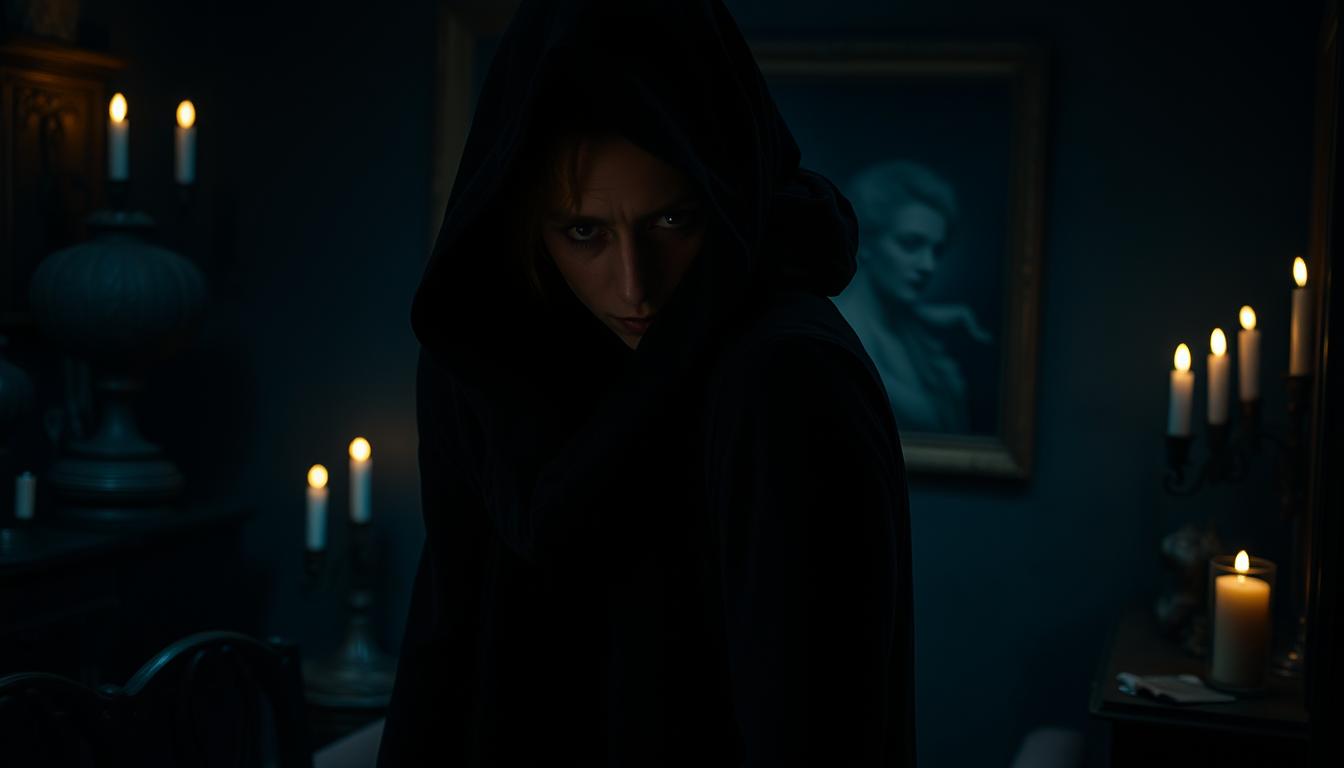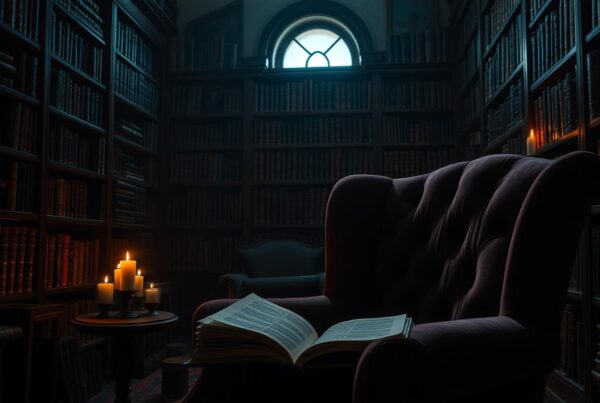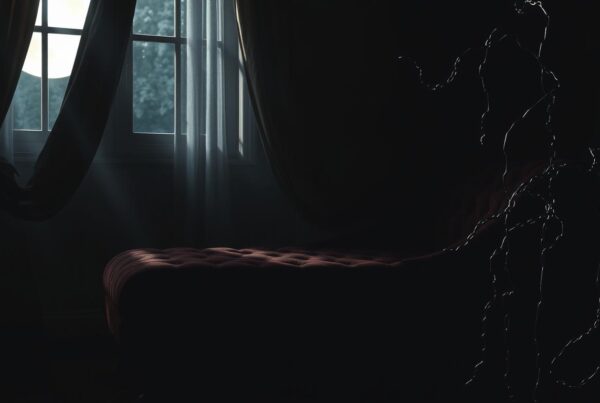Dark psychological romances grab our attention with their deep stories and complex characters. They dive into the human mind, showing the mix of feelings and reasons behind what characters do. In these thrillers, understanding each character’s mind is key.
The charm of dark romance novels is how they show the many sides of human behavior. Characters face their inner struggles, past hurts, and mixed desires. This makes their stories full of twists and turns, keeping us guessing.
Let’s look into what makes these characters tick. We’ll see how their pasts and unresolved issues affect their choices and relationships. Join us as we explore the world of dark psychological romances and their complex characters.
The Allure of Dark Psychological Romances
Dark romance genre draws in readers with its mix of passion and danger. It combines intense love stories with thriller elements. This mix creates a story that keeps readers hooked.
Defining the Genre
Dark psychological romances delve into the dark side of love. They show characters facing deep issues. These tales often include power struggles and hidden motives.
Popularity and Reader Appeal
Dark romances have become more popular lately. Readers love the intense emotions and unexpected twists. This genre offers a thrilling escape where love and danger meet.
Psychological Elements in Romance
This genre explores the human mind deeply. Characters deal with past traumas and inner struggles. These elements make the love stories complex and engaging.
Exploring the Depths of Character Motivations
Dark psychological romances grab readers with their deep characters and motives. They dive into the human mind, showing what drives people. This makes the story full of emotions and conflicts.
Motivation analysis shows what’s really going on with a character. In dark romances, heroes often face inner battles. These battles come from past hurts or unfinished business.
These battles can lead to bad choices or self-harm. It’s a big part of their story.
Complex characters are key in dark romances. They want love but fear being open. This fight inside them makes the story exciting and keeps readers hooked.
Looking into character motives in dark romances lets us see human nature. These stories show us the complex side of people. They help us understand what makes us act and how we connect with others.
The Role of Trauma in Shaping Characters
Trauma is key in making characters in dark psychological romances. These characters often have deep emotional scars. These scars shape their actions and how they connect with others.
Childhood Experiences and Their Impact
Early life shapes a character’s story. Traumatic events in childhood can lead to trust issues or a fear of being close. These wounds often guide how they act in adult relationships.
Unresolved Past Issues
Characters in dark romances often face unresolved trauma. These issues cause inner struggles that make the story tense. As they face their past, readers see their journey towards healing.
Coping Mechanisms and Defense Mechanisms
To cope with their past, characters use unique strategies. Some build walls, while others seek control or harm themselves. These ways of dealing with trauma add depth to their personalities and make the story richer.
Power Dynamics in Dark Romantic Relationships
Dark romantic stories show intense relationships. They grab readers with power struggles between characters. The mix of dominance and submission makes the story exciting.
In these stories, one person usually has more control. This control can come from money, status, or emotional tricks. The person being controlled might feel stuck but still wants to be with the other.
Authors make these power struggles interesting. They show characters’ fights with their feelings. The one in charge might use sneaky ways to keep control. The other might struggle with wanting to leave or stay.
These relationships are a mix of love and obsession. The power difference can lead to bad situations. Yet, readers can’t stop reading to see what happens next.
The Complexity of Love and Obsession
Dark psychological romances often explore the fine line between love and obsession. These stories delve into the minds of characters caught in a whirlwind of intense emotions. They blur the boundaries between healthy attachment and unhealthy fixation.
Blurred Lines Between Love and Obsession
In these narratives, obsessive love takes center stage. Characters find themselves consumed by their feelings. They can’t tell genuine affection from an all-encompassing need for their partner.
This intense focus can lead to possessive behaviors. It can also cause a loss of individual identity.
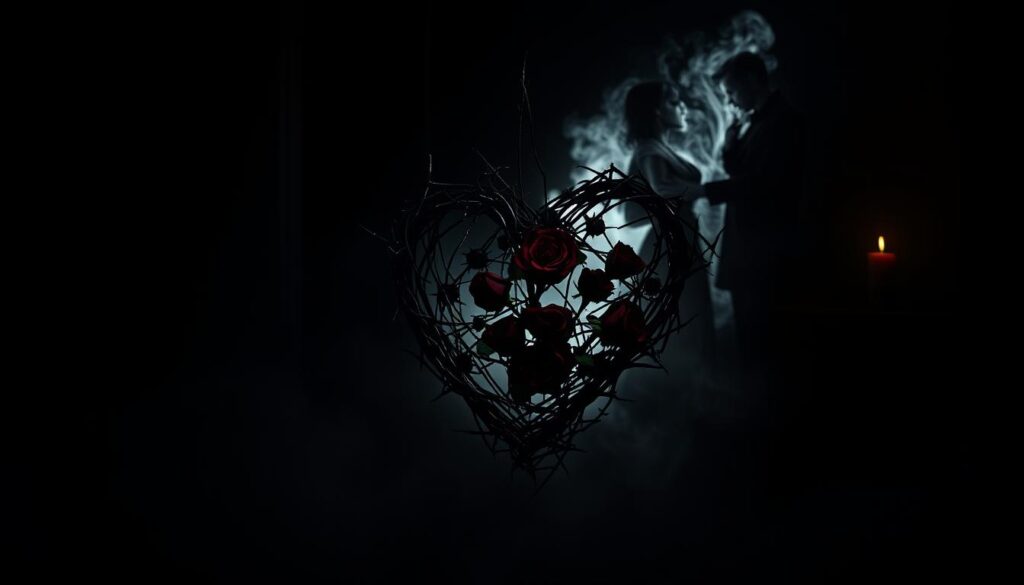
The Addictive Nature of Toxic Relationships
Toxic relationships in dark romances often have an addictive quality. Characters become entangled in cycles of intense passion and pain. They can’t break free despite the harm they experience.
The emotional highs and lows create a sense of dependency. This keeps them returning to their destructive partners.
Psychological Manipulation in Romance
Romantic manipulation plays a significant role in these stories. Characters may use subtle tactics to control their partners. This includes gaslighting or emotional blackmail.
This psychological warfare adds depth to the plot. It creates a tense atmosphere where trust is constantly tested. Boundaries are pushed to their limits.
Redemption Arcs: From Darkness to Light
Dark psychological romances show characters fighting their inner demons. These stories grab readers with character redemption and transformation arcs. As heroes face their past errors and flaws, they start a journey of growth.
The road to redemption is tough. Characters must beat deep fears, face painful memories, and change bad habits. This journey of self-discovery is at the core of many stories.
Transformation arcs often mean characters learn to trust, love, and forgive. They deal with guilt, shame, or feeling unworthy. As they overcome these, readers learn about the human mind and its ability to change.
Redemption in dark romances isn’t just about personal growth. It also affects relationships, helping characters form deeper bonds and heal old wounds. This mix of personal change and love adds depth to the story, making it more fulfilling.
The Inner Struggle: Battling Personal Demons
Characters in dark psychological romances often face tough inner fights. These battles shape their actions and move the story along. Let’s look at the psychological struggles that make these characters so interesting.
Self-Destructive Tendencies
Many characters push away love and happiness. They might think they don’t deserve good things or fear getting hurt. This inner fight creates tension and drama in the story.
Conflicting Desires and Needs
Characters often have a hard time between their heart and mind. They might want love but fear being close. This struggle leads to unpredictable behavior and keeps readers guessing.
The Search for Identity and Belonging
A common theme is the quest for self-discovery. Characters may feel lost or disconnected, searching for their place. This journey adds depth to their struggle and makes them relatable.
By exploring these inner battles, authors create complex characters. Readers can’t help but support them. The psychological struggle is key to the story, driving the plot and keeping readers hooked until the end.
Complex Motivations: What Drives Characters in Dark Psychological Romances
Dark psychological romances grab readers with their deep character motivations. These stories dive into the minds of complex people. They look at what drives their actions and choices.
Characters in this genre often face conflicting desires. These come from past traumas or unresolved issues. Their psychological makeup shapes their choices, leading to complex decisions.
Authors mix different psychological elements to create complex characters. They show how childhood, society, and fears shape a character’s view and actions. This mix of motivations drives the plot, creating tension and conflict.
Getting to know these complex motivations helps readers connect with characters. It makes them see the gray areas of human nature. This depth makes dark romances stand out, offering a rich and engaging read.
The Psychology of Antiheroes and Morally Gray Characters
Dark psychological romances often feature antiheroes and morally gray characters. These complex individuals blur the lines between good and evil. They challenge our perceptions of right and wrong.
Moral ambiguity is a key trait of these characters. They face internal conflicts, making choices that may seem questionable. But these choices are driven by deep-seated motivations.
Character complexity is key in creating memorable antiheroes. Their backstories often include traumatic experiences or difficult circumstances. These factors shape their morally gray actions.
Readers are drawn to these characters because they reflect real life’s complexities. The appeal is in seeing their internal struggles and growth. This depth makes for a more immersive and thought-provoking reading experience in dark romance novels.
Exploring Trust Issues and Vulnerability
Trust is key in any relationship. Dark romances show the hard parts of trust and facing betrayal. They make us feel the deep emotions when characters try to open up.
Fear of Intimacy
Characters in dark romances often fear getting close. This fear comes from past pain or trauma. They find it hard to trust others again.
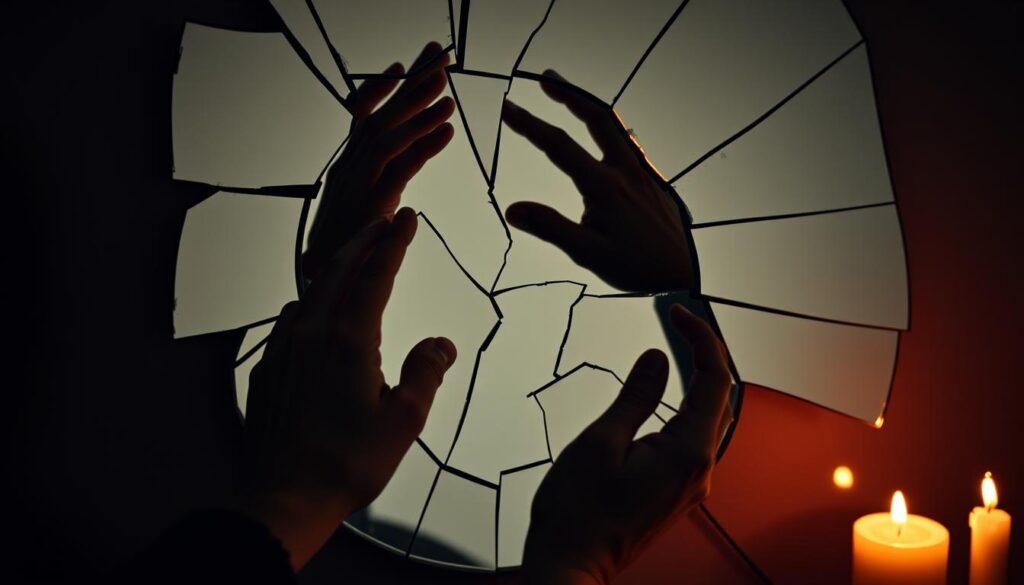
The Role of Past Betrayals
Past betrayals affect how characters see new relationships. These experiences make them build walls. They see opening up as risky.
Building Trust in a Hostile Environment
Dark romances set characters in tough places. This makes trust even harder to build. They must trust each other despite dangers.
Dark romances help us think about love and relationships. They show us that true connection takes courage. It means risking our hearts.
The Impact of Societal Expectations on Character Behavior
In dark psychological romances, characters deal with social pressure and the choice between following the crowd or standing out. These stories show how society’s rules influence people’s decisions and actions. It’s a constant battle between what they want and what others expect.
Characters often feel forced to fit into certain roles or behaviors because of social pressure. This pressure comes from family, culture, or society. The fight to meet these expectations while staying true to oneself is a key part of the story.
Rebellion in characters is a way to fight back against too much social demand. Some characters openly challenge society, staying true to themselves no matter what. Others might seem to follow the rules but secretly have their own desires or identities. This inner struggle makes characters more real and relatable to readers.
The fight between following the crowd and being yourself is a big theme in these stories. Authors use these themes to show us the human side of dealing with society’s expectations. They help us understand the importance of staying true to oneself.
Unraveling Family Dynamics and Generational Trauma
Family psychology is key in dark psychological romances. It shapes characters’ actions and feelings. Dysfunctional family ties can leave deep scars, affecting their love lives and growth.
Intergenerational trauma affects characters deeply. It’s about how past traumas are passed down, causing ongoing pain. Characters often face the same struggles in their love lives.
These stories reveal the hidden sides of family life. They show how characters, shaped by bad family ties, seek true love. This makes the stories relatable and deep, helping readers connect with the characters’ journeys.
The Influence of Setting on Character Development
The setting is key in dark psychological romances. Gothic romance uses spooky places to add tension and show hidden traits. Our surroundings greatly affect our thoughts and actions, as environmental psychology shows.
Gothic and Noir Elements
Dark castles and foggy streets create intense feelings. Characters in these places become more deep and mysterious. The gothic romance genre is all about this connection, making stories unforgettable.
Isolated and Claustrophobic Environments
Secluded mansions or remote islands make characters face their fears. In tight spaces, feelings grow stronger and secrets come out. This isolation can lead to big changes or dangerous obsessions.
The Role of Atmosphere in Shaping Motivations
Gloomy weather and dark corners show characters’ inner struggles. The setting acts like a character, guiding decisions and moving the story. Writers use these elements to create a world that grabs readers and brings characters to life.
Crafting Multidimensional Villains in Dark Romance
Dark romance novels are all about complex villains. These characters grab our attention with their depth and mystery. They make us question what’s right and wrong.
Creating great villains is all about their backstory. Writers explore their past and what drives them. This makes them feel real and sometimes even likable.
Good villains in dark romance are both charming and scary. They pull the protagonist in and push them away. This creates a fascinating relationship. As the story goes on, these characters grow and become key to the story.
The best villains challenge what the protagonist believes. They make them see the world in a new light. This battle of minds keeps us hooked until the end.
Conclusion: The Enduring Appeal of Complex Characters in Dark Romance
Dark psychological romances pull us in with their deep look into the human mind. They show us characters with flaws but still interesting. This keeps us reading, wanting to know more.
The stories’ power comes from their deep look into the human soul. Characters face past hurts, inner struggles, and mixed feelings. This makes us feel connected to them, understanding their pain.
As we get to know these characters, we become more engaged. We see them fight their inner battles and learn to trust. It’s their depth that makes us keep reading, showing that our complexities are what make us memorable.
